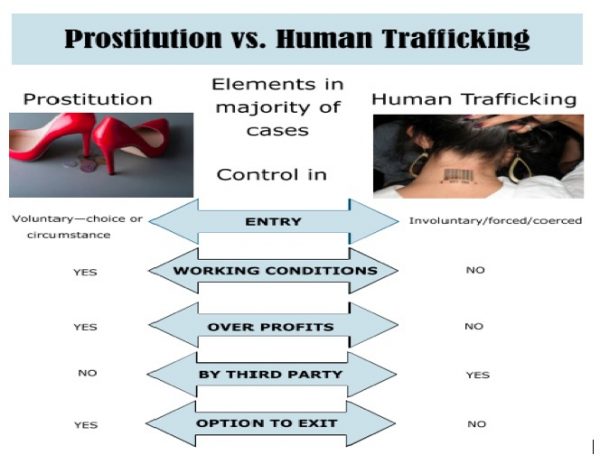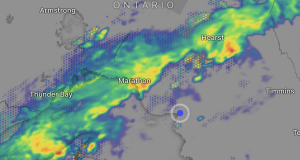May 9, 2018 @ 08:03
Although there is an undeniable connection between prostitution and human trafficking in the context of commercial sexual exploitation (sex trafficking), it is important to make the distinction between the two; keep in mind that although outlining theoretical definitions is possible, reality is far more nuanced. Consent and control are the main distinctions between the two situations. The Criminal Code of Canada under sections 279.1 and subsections, states that there is no consent for human trafficking.
Women who are involved in sex work voluntarily have control over the operations of their work and they consent to it. They keep their money and can make up their own hours and choose their customers (see graphic). On the other hand, trafficked victims may have begun stripping or participating in the making of pornography, but can ultimately end up in forced prostitution.
Victims are being forced, coerced or deceived into participating in sexual behavior for the benefit of the pimp. In addition, the victim will not get to keep any of the money, choose who they work for, when they work, how long they work or make any other decisions. Victims are often times unaware of their rights and they may even feel like their “boyfriend” loves them and they are doing it to please him.
The following chart demonstrates the differences between prostitution and sex trafficking.
In reality, it is far more difficult to make a clear distinction between voluntary sex work and sex trafficking. There have been numerous cases documented in Ontario where people initially entered sex work voluntarily but have become increasingly vulnerable to exploitation by pimps due to the nature of the work and the circumstances that led them there to begin with (poverty, substance abuse, homelessness etc) One survivor recounts the dynamics of her experience being trafficked “they knew that I had a dysfunctional family, they knew that I was coming from that, so it was easy, it was easy..”
Under these circumstances, we should consider whether it is really a choice when the choice is between having enough to eat and having shelter by participating in the sex trade or not participating in the sex trade and going hungry and becoming homeless.
Erin Bishop, Wawa and Area Victim Services, Anti-Human Trafficking Resource Coordinator
- SSM RotaryFest Take Your Pick Draw is back - July 4, 2025
- Thank You – M.H.S. Graduation 2025 - July 2, 2025
- Men’s NIght Golf – June 26 - July 1, 2025
 Wawa-news.com You can't hear the 'big picture'!
Wawa-news.com You can't hear the 'big picture'!


CBC news reported last year that nearly half of all Canadians are living paycheque to paycheque.
How are they different than your imagined victim that is working as a sex worker to stay fed and housed?
How many of your personal friends are independently wealthy and don’t require jobs? We all need to work. That’s just life.
Why is it my decision to be a sex worker is even your concern? I can give it away and you are fine with it. But the moment I capitalize on it I’m a victim? No. Consent is consent. If there are drug dependencies then it is an addiction problem, not a prostitution problem. I’m sober and I work willingly. And I keep my eyes wide open. And I advocate decriminalization because making buying sex illegal is hurtful and ridiculous. Mean spirited legislators making mean spirited laws.